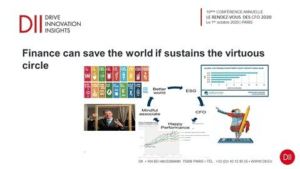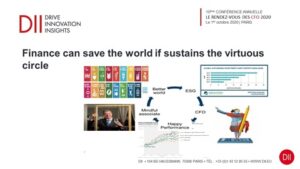The Happiness Advantage

Make your numbers
Last post generated quite some buzz, as the topic of Finance and happiness seems really difficult to be combined. The Happy CFO was sharing happiness for the outcome and achievement of his unit: “All targets were over achieved, my unit was in great shape: shouldn’t be the time to share positive feelings, emotions and happiness? I was so happy and content of the achievement and enjoying absorbing the happiness of the many colleagues in the same situation”. As CFOs, we are trained to be prudent in assessing how past result can drive future outcome, we spend hours in analysing different options and alternatives, teams work hard to identify elements predictive of the future. So when results come, it is important to communicate positively and share happiness for the achievements. Happy and CFO then can live together.
Happiness and Achievements
There were many enthusiastic comments to the post, but among them one really stroke me: “(..) but it’s really hard to me thinking into the happiness and the unhappiness like something correlated to the successful results”.
How is it possible? For The Happy CFO, achievement is everything. So, also inspired by a post from Amy Carrol, Communication Coach, I found a nice TED Talk by Shawn Achor “The Happy Secret to Better work”.
In it Shawn explains that research shows:
25% of job success is predicted by IQ
75% of job success is predicted by optimism
He explains a lot about his research on Happiness. Amy brings the definition: “Before we go into the research, let’s clarify what we mean by happiness; Happiness is, at its essence, a positive mind-set. A positive mind-set is most obvious when we are happy, and easiest for us to identify. If happiness is a sign of positivity then it is also a key part of communication. Our own happiness, and the happiness of others around us impacts our ability to communicate effectively and productively”.
Shawn: “Success?, you just changed the goalpost of what success looked like. You got good grades, now you have to get better grades, you got into a good school and after you get into a better one, you got a good job, now you have to get a better job, you hit your sales target, we’re going to change it. And if happiness is on the opposite side of success, your brain never gets there. We’ve pushed happiness over the cognitive horizon, as a society. And that’s because we think we have to be successful, then we’ll be happier”.
Nowadays the Epicurus’ Letter on happiness is forgotten: “We must remember that the future is neither wholly ours nor wholly not ours, so that neither must we count upon it as quite certain to come nor despair of it as quite certain not to come.We must also reflect that of desires some are natural, others are groundless; and that of the natural some are necessary as well as natural, and some natural only. And of the necessary desires some are necessary if we are to be happy, some if the body is to be rid of uneasiness, some if we are even to live. He who has a clear and certain understanding of these things will direct every preference and aversion toward securing health of body and tranquillity of mind, seeing that this is the sum and end of a happy life”.
The Happiness Advantage
Shawn’s research seems to confirm Epicurus’ intuition:”But our brains work in the opposite order. If you can raise somebody’s level of positivity in the present, then their brain experiences what we now call a happiness advantage, which is your brain at positive performs significantly better than at negative, neutral or stressed. Your intelligence rises, your creativity rises, your energy levels rise. In fact, we’ve found that every single business outcome improves. Your brain at positive is 31% more productive than your brain at negative, neutral or stressed. You’re 37% better at sales. Doctors are 19 percent faster, more accurate at coming up with the correct diagnosis when positive instead of negative, neutral or stressed.
Which means we can reverse the formula. If we can find a way of becoming positive in the present, then our brains work even more successfully as we’re able to work harder, faster and more intelligently. We need to be able to reverse this formula so we can start to see what our brains are actually capable of. We’ve found there are ways that you can train your brain to be able to become more positive. In just a two-minute span of time done for 21 days in a row, we can actually rewire your brain, allowing your brain to actually work more optimistically and more successfully. We’ve done these things in research now in every company that I’ve worked with, getting them to write down three new things that they’re grateful for 21 days in a row, three new things each day. And at the end of that, their brain starts to retain a pattern of scanning the world not for the negative, but for the positive first”.
Amy summarizes nicely what it is needed:
1. Random Acts of Kindness: Every morning when you open your inbox send one short, positive email praising or thanking someone in your team or social support network (friends, family, mentors etc.).
2. Meditation (3minutes twice per every day)
3. Exercise (daily if possible)
4. Journaling (writing down one positive experience for the day).
5. Gratitudes (writing down 3 things you are grateful for every day eg. no traffic on the way to work).
Amy completes her suggestions: And by doing these activities and by training your brain just like we train our bodies, what we’ve found is we can reverse the formula for happiness and success, and in doing so, not only create ripples of positivity, but a real revolution.
The reason this is important is what Shawn calls the “Happiness Advantage”: When it’s positive your brain works significantly better than when it is negative, neutral or stressed. Intelligence, creativity, and energy levels rise. If you act happy, others will perceive you this way and since energy is contagious, they will send it back to you and guess what, you’ll start to actually feel happier!!
That’s why, when celebrating successes of my unit, I was The Happy CFO.





